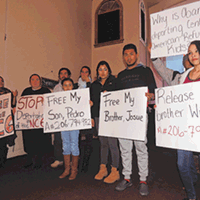I'll always remember the panic in Carmen Salmeron's voice.
Sitting in Salmeron's living room in north Charlotte in February 2016, she was beside herself with fear that her son, Pedro, would soon be deported. Pedro was one of the NC6, a group of young men who arrived in the United States as teens fleeing gang violence in Central America, only for each to be arrested in a series of early-2016 raids that took place throughout North Carolina and the Southeast.
Carmen tried to remain strong in front of her daughter, an 8-year-old Charlotte native, but couldn't hold back her tears as she spoke about Pedro, who was being held at the infamous Stewart Detention Facility in Lumpkin, Georgia. He had recently told her that he had lost 20 pounds in his first month at Stewart.
"I wanted to die when I heard about my son [being detained]," she told me through a translator. "I felt that half of my life was taken away from me. From that day, our lives have not been the same; my life, my husband's life, my daughter's life."
Two years later, Salmeron's worst fears have come to pass. Her son was deported to El Salvador after spending nine months in Stewart. He had lost 40 pounds by the time he left.
In this week's cover story, reporter Victoria Bouloubasis visits Pedro in the small, rural village where he now lives. He's eating now, but not much has improved since he fled El Salvador in 2014 after the brutal murder of his cousin.
Pedro tells Bouloubasis in this story — our second partnership with the Triangle-area Indy Week — that gang members have approached him again since his return. He recalls that about a month after he was back, he was met by four men wearing masks as he tended to cows about a mile from his grandmother's farm, where he lives.
"They said they knew I was in America and assumed I had money," Pedro says.
As I read Pedro's story, I can't help but think of the pain that Carmen and her husband, Daniel, are feeling as they now face the revocation of Daniel's work VISA. They face a decision of "whether to stay here illegally for the sake of their 10-year-old daughter, an American citizen, or pick up and leave for a native land now considered the murder capital of the world," as Bouloubasis writes.
Another thing that strikes me anytime I read a story like this is a comment on a past story I wrote about immigrants and refugees in Charlotte.
This person, who aptly named himself "Some Guy" simply for the sake of writing his comment, scoffed at the idea that immigrants and refugees should be looked at as humans.
"Anytime the immigration debate comes up, the main narrative is always centered around humanizing some little boy with a dream, or some victim fleeing a burning village," Some Guy wrote. "This sort of feel-good story line always attempts to personify immigration into the U.S. as a virtue, but no one has the courage to attempt to talk about this complex issue from the bigger picture."
I was taken aback but not surprised at this line of thinking. God forbid we try to look at the human side of a story about ... humans. Now, under a president who pushes a false narrative about the criminality of immigrants by calling them rapists and murderers, and sharing news stories about undocumented people who commit crimes, the Some Guys of the world are coming out of the shadows. Their dehumanization of the "other" has become mainstream.
So let's take a look at that bigger picture that Some Guy was compelled to bring up. Stats have long shown that there is no truth to the narrative that undocumented immigrants create an economic drag on our economy, showing up and wanting benefits without working for them. In fact, immigrants and refugees are more likely to be small business owners than native-born Americans.
According to a recently published Inc. article by Adam Bluestein, "From 1996 to 2011, the business startup rate of immigrants increased by more than 50 percent, while the native-born startup rate declined by 10 percent, to a 30-year low."
Despite making up just 13 percent of the population, immigrants start more than 25 percent of new businesses in the U.S. It seems as if the folks who would leave behind everything they know and risk their lives to reach the U.S. just to make a better life for their children are the exact types of people we want in this country.
But we don't even need the do-gooder stories and economic stats to know that's the right call. One only needs to spend an afternoon with a family like the Salmerons.
Because in the end, they are human. We are human. No matter what Some Guy says.




